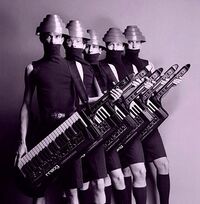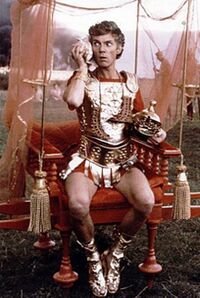Uncyclopedia:Writing lists
| This page is considered a policy on Uncyclopedia. It has wide acceptance among editors and is considered a standard that everyone should follow, unless they don't want to, in which case they are free to ignore it so long as they're not being a dick. Please make use of the standing on one knee position to propose to this policy. |
This guideline in two nutshells (because you can't fit two nuts in one nutshell):

- Lists are inherently repetitive because they are designed with a single theme that each entry must follow. If the joke is contained in the list's theme and not in its entries, you're just telling the same joke over and over.
- If there is no funny way to get from point A to point B, use the shortest way, which is usually a list. If there are funny ways to get from point A to point B, use the funniest way, which is usually not a list.
A list is a simple way to write a series of items. Each list has its own rules for what belongs on the list: A shopping list contains only items you want to buy. The writer and reader both save time by using a list rather than repeating words for each item, such as "I need to buy eggs. I need to buy milk. I need to buy bread. I need to buy porn."
So a list is a formatting tool, nothing more. If your writing is funny, and it would be pointless to repeat the missing words, using a list is a good thing. If your writing is not funny, making it a list only makes that fact more glaring.
Lists are not automatically funny. Moreover, new users see a list and immediately add to the end of it, forever. The reader can easily skip over the list, but will never actually stop to consider each unrelated, undeveloped idea.
If you see an unfunny list, try to repair it:
- Add text that relates the items to one another.
- Develop each item into a full paragraph or two, so that it doesn't just state a potentially funny concept but brings out the humor.
If the above seems impossible:
- Delete the list entirely.
- But if there is no other value, delete the page: If the article is based on unfunny lists, nominate it at Votes for deletion. If the page is nothing but lists, use Quick VFD to ask an Admin to delete it for that reason.
If you know an article has a problem but can't decide how or whether to repair it, attach {{Anti-list}} to alert a senior editor to take a look at it.
Bad lists[edit]
Any list that breaks the first nutshell is a bad list.
- FLOPs
A FLOP is a Frivolous List Of People. Here's one:
- List of people who can't tie their shoes
- Jesus
- Oprah
- Hitler
- Oscar Wilde
- Chuck Norris
- Steve Ballmer
- George W. Bush
- Kanye West
- Your mom
Besides being full of clichés, this list is a weak attempt at humor, so weak that it doesn't even look funny.
What would happen if you wrote the above list out?
- Jesus doesn't know how to tie his shoes. Oprah doesn't know how to tie her shoes. Hitler doesn't know how to tie his shoes. Oscar Wilde doesn't know how to tie his shoes. Chuck Norris doesn't know how to tie his shoes. Steve Ballmer doesn't know how to tie his shoes. George W. Bush doesn't know how to tie his shoes. Kanye West doesn't know how to tie his shoes. Your mom doesn't know how to tie her shoes.
When written like this, it becomes clear how such lists are just stupid and not funny. Each entry adds nothing to the article that the previous entries didn't already have. Good lists tell many jokes. This list tells the same unfunny joke over and over, and that is what makes a list bad.
Some editors who can't write actual sentences feel they can to add items to lists like this one. Adding a politician or actor I don't like is a way to claim he can't tie his shoes — isn't that funny? Not funny enough, especially when the list grows to dozens of items.
- Wikitables
God bless you if you type precisely enough, and study the rules enough, to code wikitables. But advanced formatting doesn't remedy lack of humor. A table can be as unfunny as the same material as a list:
| Table of people who can't tie their shoes |
|---|
| Jesus |
| Oprah |
| Hitler |
| Oscar Wilde |
| Chuck Norris |
| Steve Ballmer |
| George W. Bush |
| Kanye West |
| Your mom |

- Discographies/Filmographies
Taking a list of an artist's works and applying a transformation to each one (usually a dumb pun or a bit of toilet humor) is something that anyone can do. The resulting list is tediously unfunny and doesn't help the article entertain. Even if it helps the article imitate a Wikipedia article, it isn't worth it.
- Infoboxes
Infoboxes — thumbnail summaries in the upper right corner of an article on nations, heads of state, and so on — exist to imitate Wikipedia, but are essentially lists of unrelated items that have no room to develop good jokes. If an article has an Infobox, you need not fill in every field, and you should not if you have nothing but a nonsense number or a list of ridiculous "exports" (a bad list inside a bad list). Keep Infoboxes small, and develop your jokes in paragraphs of prose.
- Galleries
Galleries are a pictorial list. When you put a gallery in an Uncyclopedia article, you are telling the reader, "Look at this! Now look at this!" A far better way to be funny is to use pictures sparingly and do actual work writing captions that give each photo some humor it didn't have originally. There's more about this at How To Be Funny And Not Just Stupid.
- Also-Known-As
Many editors put, just after an article introduces its subject, other names by which the subject might be known. These also tend to be dumb puns and bits of toilet humor. The reason for this tendency is that new editors want their little gift to be right on the top line of the article. The problem with editing the start of the article is that the start of the article needs to be inviting to the reader; and the problem with adding a list here is that it hits the reader with dumb, repetitive humor, or digressions from the theme, before the article has delivered any real laughs, and sometimes disrupts the original author's attempt to set the stage for what the article will try to do.
- "Not to be confused with..." is not the same thing but has exactly the same problem.
- You Have Two Cows
The article You have two cows is a massive list. It is good that each list item is more than just the name of a person or thing. However, the text of the list items is the exact same joke told with respect to some stereotype of a nationality, a race, or a political view. (Also, it is not original to Uncyclopedia; also, it is sometimes offensive to various of the targets, which would be fine, if it made the article funnier.) We mention how the coyote fails to catch the Roadrunner in each TV episode for a different reason. If a list contains items each of which are funny in a different way, it would be good reading. In fact, if a list looks like it contains items that are all the same, but they are not, that would be the prized technique of misdirection.
The article on Ctrl sprawled into creating dozens of nonexistent keys and explaining the function of each. The challenge is not to see how long you can make this list. (The answer is infinity.) The challenge is to boil it down into a presentation the reader will laugh at.
Mediocre lists[edit]
Giving a list unique entries isn't always enough to make it good. Some lists have enough quality to not be huffed on first sight, but would be better if they were written as prose instead of as a list. For example:

- List of people who ruled the entire world
- God was the world dictator from the beginning of time to the beginning of man, except for when the dinosaurs stepped in. God was considered world leader because he had full control over the world's only conscious being, himself. He claims to be the permanent world ruler, but then again, so does every world ruler who loses his power before he dies.
- Caligula ruled the entire world before handing the reigns to his horse. The horse decreed that there would be a sack of oats in every house, and that cavalries could only ride in to war on zebras.
- Alexander the Great conquered Europe and the Middle East. This made him ruler of the world because at the time, Africa, Asia, America, Australia, and Antarctica didn't yet exist.
- After discovering the New World, Christopher Columbus claimed "finder's keepers", making him legally the owner of America. However because Columbus thought that the land he found was eastern Asia, he claimed he had found and therefore owned the old world. Considering everyone who disagreed that Columbus had found the old world was declared a heretic and burned at the stake, his claim to world ruler went mostly undisputed.
- Shakespeare ruled the world... or was that the Globe?
- George W. Bush was President of the World from 2000-2008, although his claim is disputed by people who believe that there may be other parts of the world outside the US.
By expanding a flat list of names, the author worked in more humor in many varieties. However, if it were converted from a list to a full-blown article, there would be room to follow even more leads. How did each person become a world leader? What did they do while they were world leader? How did they lose control of the world? What happened between world leaders? Were there any people who came close to becoming a world ruler whose attempts warrant being mentioned? An article about world leadership would be much funnier documenting the follies that happened at every step of the way. At that point, there is no reason to structure it as a list at all.
Good lists[edit]
Like Justice Potter Stewart, sometimes we can't define something, but "we know it when we see it." And, like all Uncyclopedia policy rules, you can break the rules against lists if you use really clever writing. The following articles are based on lists but have all been voted to be featured on our main page:
- You have two cows
- The Oldest Trick in the Book
- List of weapons that don't exist, but should
- Worst 100 Ways to Deliver Bad News
- Banned from the Internet
- Greatest Inventions
- Unquotable:Cthulhu
- Unquotable:Keanu Reeves
- The Official List of the Best Things in Existence
- Schindler's Listcruft
Note that they were all written before 2007, and as such as more representative of the early culture of the wiki. But times have changed.



